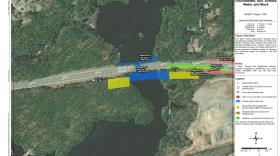The Environmental Protection Agency will develop new regulations on certain industrial chemicals in drinking water. The substances, called PFAS, have been a problem on New Hampshire's Seacoast and elsewhere.
EPA Administrator Scott Pruitt said at a summit on PFAS in Washington on Tuesday that they’ll talk about the issue in Portsmouth next month.
New Hampshire environmental regulators joined officials from at least 30 other states and tribes at the summit.
One advocate from the Seacoast, Testing for Pease founder Andrea Amico, also met with federal officials before the summit.
PFAS (per- and polyfluoroalkyl substances) are a huge class of man-made chemicals sometimes called PFCs. They were common until recently in everything from non-stick cookware to firefighting foam.
Some studies have linked some types of PFAS to cancer and other health issues.
New Hampshire and other states base their PFAS standards on a 2016 non-binding EPA health advisory. But some states use a stricter standard – which some affected residents say can make all the regulations feel arbitrary.
Now, the EPA says it will create a hard legal limit, called a maximum contaminant level, for PFAS chemicals in drinking water.
Speaking from the summit at EPA headquarters, New England EPA chief Alexandra Dunn told NHPR that standard will be based on available testing technology and cost, as well as health risks.
"Candor" and "Priorities"
She says the agency also wants to list some types of PFAS as hazardous substances at federal toxic waste sites, and it wants to do more scientific analysis.
"A lot of the conversation [Tuesday] was about how we handle uncertainty when our science is not moving as quickly as the communities need it to be,” she says. “I think the conclusion … was that we need to be open and transparent about what we know and what we don't know.”
Dunn says the Portsmouth meeting will be the first stop on a national listening tour. It’s tentatively scheduled for June 25 and 26.
"I think the conclusion was that we need to be open and transparent about what we know and what we don't know." Alexandra Dunn, EPA Region 1 administrator
PFAS chemicals were found in high levels in the water of residents and businesses around Pease International Tradeport in 2014. Pease will now take center stage in a separate upcoming federal study on the chemicals.
Some Seacoast residents also fear PFAS may be spreading from the Coakley Landfill Superfund site, though officials say water supplies around that site are safe to drink.
Either way, Dunn says she recognizes residents are worried. She says the EPA wants to hear from residents in Portsmouth and around New England about their experiences:
"I think their candor will be very important,” she says. “But I'd also like their input on prioritization."
Staff from U.S. Sen. Maggie Hassan's office will attend the Portsmouth meeting.
And U.S. Sen. Jeanne Shaheen said in a Tweet that the meeting would be "a valuable opportunity for EPA to respond to concerns [and] incorporate suggestions into their plan."
Calls for Transparency
Hassan has also joined some colleagues in Congress in calling for the EPA to allow the release of a particular recent study on PFAS.
The agency has reportedly blocked publication of that study by an arm of the Centers for Disease Control and Prevention.
The study reportedly suggests some PFAS chemicals endanger human health at far lower levels than the EPA currently advises.
In a letter to Michigan Congressman Dan Kildee, provided to NHPR, EPA Administrator Scott Pruitt says his agency “does not have the authority to release this study” and says “the Department of Health and Human Services … has the authority to release it.”
New Hampshire Congresswoman Carol Shea-Porter also wants the study released.
“Our communities deserve answers, and the EPA seems to be doing everything in its control to block the public from getting them,” Shea-Porter says in a statement. “It’s reprehensible.”
She also referred to reports that EPA security physically ejected a journalist who was trying to enter the PFAS summit Tuesday. And she criticized the EPA for inviting a member of a chemicals industry lobbying group to discuss the science of PFAS at the summit.
An earlier version of this article incorrectly attributed a Tweet about the EPA's planned Portsmouth meeting to Sen. Maggie Hassan, and stated that Sen. Hassan would attend the meeting. In fact, the tweet came from Sen. Jeanne Shaheen, and staff from Hassan's office will likely attend the meeting.







